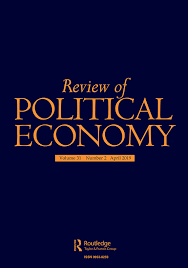Dear Friends and Colleagues,
The 3rd international Workshop on Demand-led Growth: Stagnation theories and stagnation policies” is postponed to July 12-15, 2021, due to the Covid-19 outbreak. The call for papers is also postponed to March 15, 2021.
We think everyone’s health at this moment is the highest priority and hope to see you all in Rio de Janeiro next year.
The Local Organizing Committee
Institute of Economics, Federal University of Rio de Janeiro (IE-UFRJ)
Confirmed Keynote Speakers: Louis-Philippe Rochon (Laurentian University), Anthony Aspromourgos (University of Sydney)
Schedule: TBA
CALL FOR PAPERS
May 15: submission deadline
June 1: notification of selected papers.
The Journal Review of Political Economy is sponsoring the Workshop and a selection of papers will be submitted as a Symposium to the Journal.
The Young Scholar Initiative is supporting the Workshop and the dates July 13-14 will be devoted to the presentation of papers from YSI.
Slightly ten years after the financial crisis of 2007/2008, developed and developing countries have continuously struggled with high unemployment and sluggish growth rates. Nominal and real interest rates have reached remarkably low levels with negative effects on economic activity. Fiscal austerity measures seem to have prolonged and worsened the economic performance of several countries. As a result of the seemingly faint and negative impact of these macroeconomic policies, institutions such as the IMF along with a few prominent economists have altered their position and begun to defend expansionary fiscal policy measures as a tool to promote growth and employment in stagnating economies. The belief that fiscal and monetary policies along with aggregate demand can have long-lasting effects on the performance of economic growth and employment is not new to non-mainstream economists. This line of reasoning can be traced back to the works of Keynes and Kalecki beginning in the 1930s. Recent developments include Modern Monetary Theory but also the literature advanced by a plethora of other heterodox traditions which have long advocated the notion of endogenous money.
The Research Group in Political Economy at the Institute of Economics of the Federal University of Rio de Janeiro follows the Sraffian framework proposed by Garegnani to make the Keynesian-Kaleckian principle of effective demand compatible with the classical surplus approach. For our Group, growth is demand-led and policy (often balance of payments) constrained. In succession, inflation is a cost-push political economy phenomenon dependent upon conflicting claims over income distribution. Within this framework, macroeconomic policies are fundamental to growth, inflation, and income distribution. In capitalist economies, these policies are borne from institutional arrangements as well as political power relations. The Research Group in Political Economy considers that the soundness of this theoretical approach is best demonstrated by constructing policy-relevant analysis along with theoretical and applied models in order to better understand the actual performance of developed and developing countries.
Given the approach taken by the Group and in the context of the intensification of dialogue and convergence among some Post-Keynesians, Kaleckians, Kaldorians, practitioners of Modern Monetary Theory, and Sraffians, the goal of the 2020 Edition of the Workshop is to strengthen this promising trend by promoting a constructive and policy-relevant debate among these strands of critical thought. Additionally, other heterodox approaches to economics are welcome and encouraged in order to facilitate new contributions concerning demand-led growth analyses, models and their multiplicity of relations with macroeconomic policies, especially with respect to the debate over secular stagnation.
The Workshop intends to provide an opportunity for its participants to discuss the issues raised in their theoretical aspects, focusing on monetary and fiscal policies in relation to the financial system as well as long-term demand-led growth.
Articles that broadly fall within the following topics are welcome:
- The debate on secular stagnation: causes, implications and the way ahead;
- Functional Finance and Modern Monetary Theory: implications for monetary and fiscal policies;
- The limits of monetary policy;
- Fiscal austerity and its effects on growth and employment;
- The role of macroeconomic policies in demand-led growth;
- Macroeconomic policies, personal and functional income distribution;
- Financial system, Indebtedness, Bubbles and autonomous demand.
- Demand-led growth: theoretical and empirical studies;
- Political economy and comparative development experiences: theoretical and empirical studies.
Papers must be written in English and contain title, short abstract (maximum 200 words), author's name, institutional affiliation and email address.
We recommend submitted papers to have a maximum number of 8000 words.
Scientific Committee: Ricardo Summa (UFRJ), Júlia Braga (UFF), Lucas Teixeira (Unicamp), Louis-Philippe Rochon (Laurentian University)
Local Organizing Committee: Ricardo Summa, Miriam Português, Lídia Brochier, Felipe Cornelio, George Kiss




